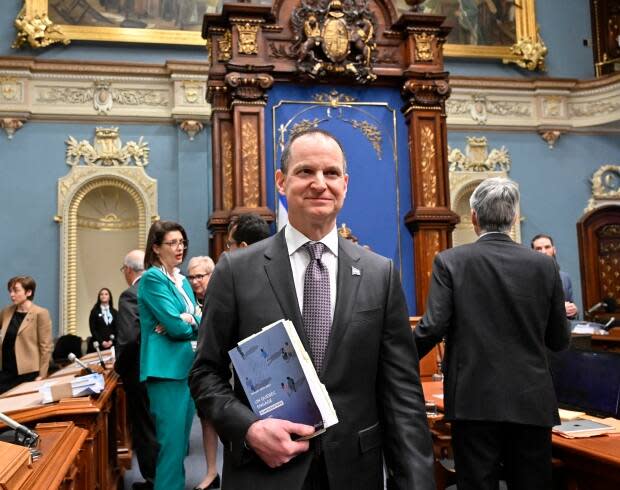Quebec budget aims to attract immigrants to regions with French classes and other support

Quebec Finance Minister Eric Girard says he wants to help solve the labour shortage by encouraging immigration to the province's regions.
As part of Tuesday's 2023-2024 budget announcement, the CAQ government committed a total of $615.2 million over six years to address the scarcity of workers.
Over 80 per cent of that money, just under $510 million, will support immigrants as they integrate into the regions over the next five years.
Girard wants to speed up the recognition of immigrants' credentials, increase support and access to French courses and encourage immigrants to choose a life outside of Montreal.
Quebec's regions have been dealing with the consequences of a provincewide labour shortage. Workers, particularly in health care, have been forced to work overtime, and health clinics and paramedic services have had to close facilities or reduce services.
"We are aware that the current shortage, combined with an aging population, will present challenges for years to come," said Girard in his speech to the National Assembly.
"Integrating immigrants into Quebec society and the labour market helps mitigate the impact of the labour shortage and the effects of demographic changes in all our regions."
Tepid reaction from business
Véronique Proulx, head of the Quebec Association of Manufacturers and Exporters, said the budget is a "timid" attempt to solve the economy's problems by "scattering" a few measures. She points out there is very little money being invested in programs to improve productivity.
The head of the province's largest employers group, the Conseil du patronat, says the plan is "good news" for the province and could lead to more investment in businesses outside of the large urban areas.
But Karl Blackburn also said the government could have found a much quicker way of finding workers by investing more in measures to encourage retirees to return to the workforce.
Hoping to encourage 'high-quality workers' to live outside Montreal
To attract immigrants and "high-quality workers" to areas outside of Montreal, Girard said he is planning to create a pilot project to help refugee claimants settle there and foster their integration into targeted sectors like tourism, health and the battery industry.
Girard noted that immigrants have an easier time integrating when they can speak French, so the government will commit $213.5 million over five years for initiatives aimed at increasing the number of remote-learning courses and expanding the offer of francization services to new clientele.

Unclear if immigration quota will change
It is unclear whether the government sees Quebec admitting more immigrants — it has capped its immigration levels at 50,000 — but it clearly wants more people settling in the regions and plans to spend $73 million over five years to encourage that.
Girard said the government will have a consultation on the appropriate level of permanent immigrants for the period of 2024-2027.
"To receive more permanent immigrants, we need to be able to increase immigration in the region outside of Montreal. This would be good because outside of Montreal it will be definitely an environment where they can learn French but we need to help them," said Girard at a news conference on Tuesday.
It's not something that is simple to accomplish, he acknowledged.
"It's not just to say 'please go to Val-D'or or Sherbrooke,' we need to make sure there are services that will support them, that the community is welcoming them ... with all the respect that they deserve."
Housing shortage another barrier to immigration
The government earmarked $164.1 million over five years to provide courses and internships for some workers, committing to support immigrants who have submitted their credentials for recognition and to offer free tuition for refresher courses so they can be admitted to professional orders in Quebec.
Girard says recognizing immigrants' credentials will make it possible to maximize their contribution to Quebec's economy and address the shortage of specialized workers in certain sectors — a key component of the CAQ's opération main-d'oeuvre which was launched in the fall of 2021 to match workers' skills with the needs of Quebec employers.
But once immigrants arrive in Quebec, Girard agreed there are secondary challenges, such as finding affordable housing.
Just this year, 50 new nurses who were supposed to arrive in the Gaspé in the spring had their arrival postponed to the fall.
The health authority had hired them as part of a new provincial program to help with the labour shortage in health care but there wasn't enough housing to accommodate the group.
Some people in the first group of workers, which included 37 nurses from Algeria, Morocco, Cameroon and Tunisia, still haven't found a place to stay after arriving in November 2022.
Girard says this is an issue that's happening everywhere — not just in Quebec — and that his government is putting in place measures like housing subsidies.
Other key commitments for Quebec's regions for the 2023-2024 budget include $1.4 billion over the next five years to improve prosperity.
In addition to supporting industries such as forestry and the bio-food sector, the CAQ wants to improve connectivity, invest money to promote higher education and help regions that are more vulnerable economically, like northern areas of the province.


